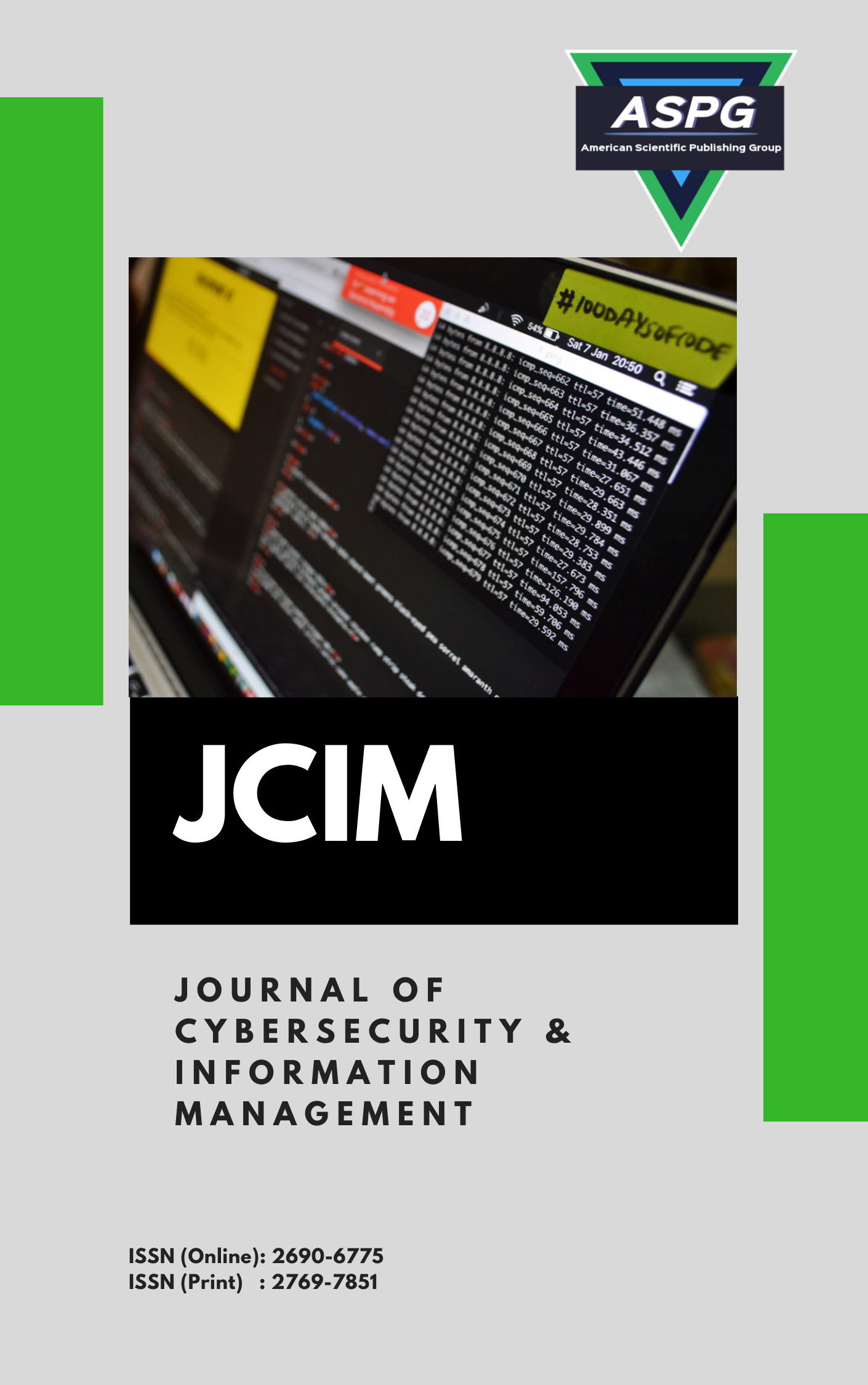

Volume 9 , Issue 1 , PP: 68-79, 2022 | Cite this article as | XML | Html | PDF | Full Length Article
Heba M. Fadhil 1 * , Noor Q. Makhool 2 , Muna M. Hummady 3 , Zinah O. Dawood 4
Doi: https://doi.org/10.54216/JCIM.090106
Botnet detection develops a challenging problem in numerous fields such as order, cybersecurity, law, finance, healthcare, and so on. The botnet signifies the group of co-operated Internet connected devices controlled by cyber criminals for starting co-ordinated attacks and applying various malicious events. While the botnet is seamlessly dynamic with developing counter-measures projected by both network and host-based detection techniques, the convention techniques are failed to attain sufficient safety to botnet threats. Thus, machine learning approaches are established for detecting and classifying botnets for cybersecurity. This article presents a novel dragonfly algorithm with multi-class support vector machines enabled botnet detection for information security. For effectual recognition of botnets, the proposed model involves data pre-processing at the initial stage. Besides, the model is utilized for the identification and classification of botnets that exist in the network. In order to optimally adjust the SVM parameters, the DFA is utilized and consequently resulting in enhanced outcomes. The presented model has the ability in accomplishing improved botnet detection performance. A wide-ranging experimental analysis is performed and the results are inspected under several aspects. The experimental results indicated the efficiency of our model over existing methods.
Botnet detection , Machine learning , Data Classification , MSVM model , Dragonfly algorithm
[1] Alqatawna, J.F., Ala’M, A.Z., Hassonah, M.A. and Faris, H., 2021. Android botnet detection using machine learning models based on a comprehensive static analysis approach. Journal of Information Security and Applications, 58, p.102735.
[2] Khan, R.U., Zhang, X., Kumar, R., Sharif, A., Golilarz, N.A. and Alazab, M., 2019. An adaptive multilayer botnet detection technique using machine learning classifiers. Applied Sciences, 9(11), p.2375.
[3] Pokhrel, S., Abbas, R. and Aryal, B., 2021. IoT Security: Botnet detection in IoT using Machine learning. arXiv preprint arXiv:2104.02231.
[4] Joshi, C., Bharti, V. and Ranjan, R.K., 2021. Botnet Detection Using Machine Learning Algorithms. In Proceedings of the International Conference on Paradigms of Computing, Communication and Data Sciences (pp. 717-727). Springer, Singapore.
[5] Xing, Y., Shu, H., Zhao, H., Li, D. and Guo, L., 2021. Survey on botnet detection techniques: Classification, methods, and evaluation. Mathematical Problems in Engineering, 2021.
[6] Kumar, K., 2021. Comprehensive Method of Botnet Detection Using Machine Learning. International Journal of Open Source Software and Processes (IJOSSP), 12(4), pp.1-25.
[7] Lee, S., Abdullah, A., Jhanjhi, N.Z. and Kok, S.H., 2021. Honeypot Coupled Machine Learning Model for Botnet Detection and Classification in IoT Smart Factory–An Investigation. In MATEC Web of Conferences (Vol. 335, p. 04003). EDP Sciences.
[8] Hosseini, S., Nezhad, A.E. and Seilani, H., 2022. Botnet detection using negative selection algorithm, convolution neural network and classification methods. Evolving Systems, 13(1), pp.101-115.
[9] Joshi, C., Ranjan, R.K. and Bharti, V., 2021. A Fuzzy Logic based feature engineering approach for Botnet detection using ANN. Journal of King Saud University-Computer and Information Sciences.
[10] Tikekar, P.C., Sherekar, S.S. and Thakre, V.M., 2021, November. Features Representation of Botnet Detection Using Machine Learning Approaches. In 2021 International Conference on Computational Intelligence and Computing Applications (ICCICA) (pp. 1-5). IEEE.
[11] Alharbi, A. and Alsubhi, K., 2021. Botnet Detection Approach Using Graph-Based Machine Learning. IEEE Access, 9, pp.99166-99180.
[12] Popoola, S.I., Adebisi, B., Ande, R., Hammoudeh, M., Anoh, K. and Atayero, A.A., 2021. smote-drnn: A deep learning algorithm for botnet detection in the internet-of-things networks. Sensors, 21(9), p.2985.
[13] Ashraf, J., Keshk, M., Moustafa, N., Abdel-Basset, M., Khurshid, H., Bakhshi, A.D. and Mostafa, R.R., 2021. IoTBoT-IDS: A novel statistical learning-enabled botnet detection framework for protecting networks of smart cities. Sustainable Cities and Society, 72, p.103041.
[14] Ibrahim, W.N.H., Anuar, S., Selamat, A., Krejcar, O., Crespo, R.G., Herrera-Viedma, E. and Fujita, H., 2021. Multilayer framework for botnet detection using machine learning algorithms. IEEE Access, 9, pp.48753-48768.
[15] Muhammad, A., Asad, M. and Javed, A.R., 2020, October. Robust early stage botnet detection using machine learning. In 2020 International Conference on Cyber Warfare and Security (ICCWS) (pp. 1-6). IEEE.
[16] Janga, V. and Edara, S.R., 2021. Epilepsy and Seizure Detection Using JLTM Based ICFFA and Multiclass SVM Classifier. Traitement du Signal, 38(3).
[17] Mehmood, Z. and Asghar, S., 2021. Customizing SVM as a base learner with AdaBoost ensemble to learn from multi-class problems: A hybrid approach AdaBoost-MSVM. Knowledge-Based Systems, 217, p.106845.
[18] Mirjalili, S., 2016. Dragonfly algorithm: a new meta-heuristic optimization technique for solving single-objective, discrete, and multi-objective problems. Neural computing and applications, 27(4), pp.1053-1073.
[19] Meraihi, Y., Ramdane-Cherif, A., Acheli, D. and Mahseur, M., 2020. Dragonfly algorithm: a comprehensive review and applications. Neural Computing and Applications, 32(21), pp.16625-16646.
[20] Elngar, A. and KRIT, S.D., 2019. Performance Analysis of Machine Learning based Botnet Detection and Classification Models for Information Security. J. Cybersecur. Inf. Manag, pp.44-53.